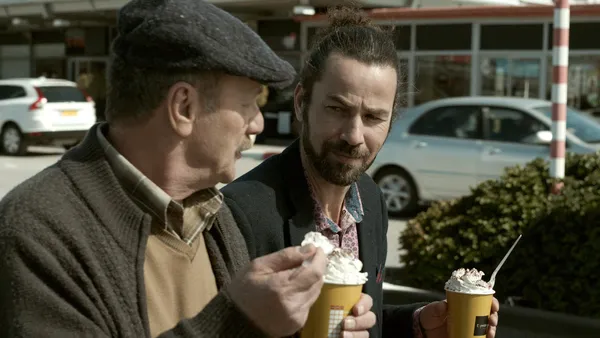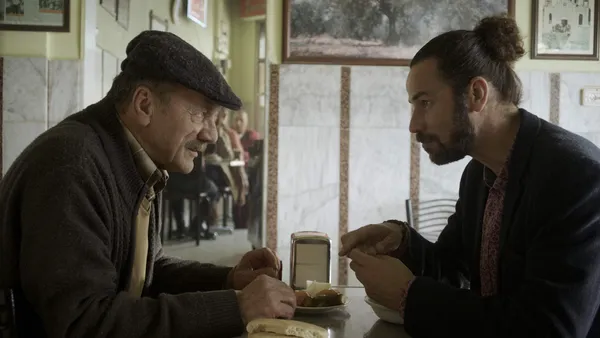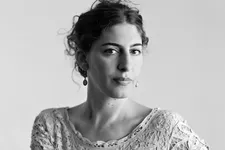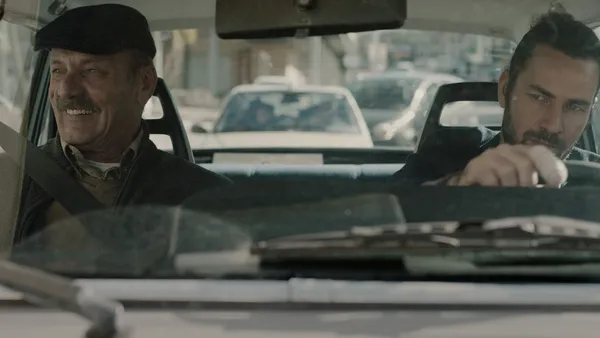 |
| Annemarie Jacir: 'I’ve had a lot of reactions from men who have come up to me after screenings and said they’re going to go and call their father' Photo: New Wave Films |
Annemarie Jacir’s Wajib (which translates as 'duty') takes place over a single day in Nazareth, as dad Abu Shadi and his ex-pat son Shadi (played by real-life father and son Mohammad and Saleh Bakri), drive around the city delivering invitations to the upcoming wedding of Shadi’s sister. I caught up for a chat with the writer/director ahead of the film’s UK release on September 14. Please note, she does refer to the final scene of the movie part-way through this interview - but not in a way that would spoil your enjoyment.
I was reading that the origin of the story came from the fact that your husband actually doing this this very thing - going round delivering invites and that you went along, is that right?
That’s correct, he’s from Nazareth, I’m from Bethlehem and my family doesn’t really practice this any more. In Nazareth, I discovered that it’s practiced by everybody still. In all the northern Palestinian towns and villages, it’s nothing unusual – it would be unusual not to do it. His sister was getting married and he told me: “I’m going to go and do this thing with my father.”
The film takes place in one day but, in reality, it would be a five-day sort of trip, because they divide up the city and then they have a day when they go to the villages and visit family and friends who live nearby. I spent five days with them just sort of traversing up and down and I was really excited about it. For them, it’s just so mundane and normal they didn’t know what I was excited about. But I thought it was great. It was a fantastic way to see the city. You go from house to house, some are family, some are friends, you really get an understanding of the whole city – different classes, different religions.
It was really interesting to me so I started to conceive of the idea. But it’s not his family - his parents are still together and they have a very good relationship.
It gives you a kind of tapestry of a town in a way. Viewing things through a car window almost. The city does play quite a crucial role in the film. They talk about Nazareth when they don’t want to talk about other things. It’s interesting, the idea of bringing the city into the car.
You never see the mother in the film but her presence is always hovering between them. The other thing is the city and the different relationship they both have with the city. Abu Shadi is trying to seduce Shadi back with this city that Shadi is not seduced by at all.
That idea of duty and people’s attitude to duty is important in the film. I was interesting how that came to play in so many different ways, even from the small characters like Shadi’s unmarried cousin Fadya. She didn’t do ‘her duty’ to society and now she has a major problem.
Yes, she has this major problem and she’s doing another kind of duty now because she’s an unmarried woman, she has to take care of her parents.
It’s that idea that one person’s duty is not another person’s duty.
Absolutely, there’s so much duty in the film. For Abu Shadi, that’s exactly right, he thinks it’s Shadi’s duty to come back. But he has come back. Shadi is also fulfilling his duty by coming to deliver the invitations.
The idea of putting up tarpaulin to hide the view. Is that perhaps because people who are living in a situation that’s difficult – they are covering it up and not looking at it too hard?
Now that you’re saying that, I didn’t consciously think of this until you mentioned it just now but they are covering up the view, to make it look different and not seeing what’s in front of them. At the same time, there’s that conversation when the girlfriend’s father calls. He’s Palestinian but he’s never been to Palestine and Abu Shadi goes through this thing of, ‘Oh, we see orange groves and we see grapes,’ and he’s giving him the fantasy that he wants to imagine. In a way, it’s similar, not dealing with the reality of what it actually looks like now.
Image is very important in the film. Even the costumes speak volumes about the characters. You only have to take one glance at the son to see the image he’s trying to portray and how he’s come back and he’s cool, whereas his dad is completely ‘of Nazareth’. Did you work quite hard on those details?
Absolutely, the outfits for Shadi was something that we worked a lot on. The detail of his hair. I said to Salem, who played Shadi, ‘Don’t cut your hair’. He had really big, curly, wild hair. And when it came to work on the film and it was all scraped back, he was like, ‘This is not comfortable at all!’. But neither is Shadi absolutely comfortable yet.
So, we worked on that and then Abu Shadi, his wardrobe. Mohammad Bakri doesn’t usually dress like that at all, he wears leather pants and is very hip and slim. When we did the wardrobe, he looks completely different, also he did the work physically. He walks differently in the film than he does in real life. It was funny because the foreign crew that was working on the film saw him only in that outfit initially. Then one day, I don’t know if it was on the weekend, we were all at his hotel. Mohammad came downstairs wearing his sexy pants and shirt, you know, the way he normally dresses, which is a little bit hip and they were shocked. They said: “Wait a minute, that’s him?”
I know you’ve talked a lot before about what a big decision it was to cast a father and son, but I wondered how just the day to day working with them once they were cast because obviously fathers and sons have that existing relationship, where they know what one another’s thinking. Did that effect the kind of dynamic you had with them?
It was really fascinating because they’re both professional actors and they both have careers of their own and now they were working together for the first time. What I thought was lovely, which concerned me initially, was they have such tremendous respect for each other. They deal with each other in a very respectful way. I know Saleh really well, I’ve worked with him on all my films, and I know how much he respects and admires his father and I thought that was going to be a problem in the film, which is why I had hesitation in casting them - because the film is about a person who has lost respect and doesn’t have respect for his father.
What was really sweet to me was how much Mohammad respected and loved Saleh in his work and admired him as a father. It was interesting on a day to day level because, of course, I knew that the tensions between the characters in the film were arced like tensions in real life between many fathers and sons and politically between them. What I didn’t expect was how close to home it would be and how it would affect the film.
A superficial example is that Mohammad stopped smoking before we shot the film – and so did Saleh. Both of them were heavy smokers and both of them quit smoking several months before we began shooting. I thought, ‘Great, I’m making a film about a smoker and he doesn’t smoke any more’. All his life he smoked but now he’s quit, but I thought: ‘Okay, that’s good and we have to support it.’ So we got special cigarettes that are not really tobacco – and about a week into shooting Mohammad started to smoke again. He was sneaking around doing it with crew members and he told them, ‘I don’t want Saleh to find out because he’s going to be so angry and disappointed in me. Don’t let him know.’ Then, of course, eventually, two weeks into it, Saleh discovered that Mohammad was smoking, so then he started smoking. So this dynamic was unfolding in front of us during the shooting.
It’s pretty much a very scripted film. But what happened was something magical that all came from the energy they have that I did not expect, for example, is the last scene, which is like a gem for me, because what happened when we were shooting that never happened before – and we never even discussed it – is that they’re sitting there in relative silence and Shadi lights up his cigarette and it’s father lights up his cigarette and if you look, they’re almost like mirrors of one another. It was so beautiful and I don’t think it could have happened with two people who don’t know each other – they weren’t looking at each other they just were feeling and doing as they do. It’s a zen moment and to see the yin and yang physically between them was the cherry on top.
How do you find, as a female filmmaker, writing dialogue for men? A lot is often made these days about men writing about women so I’m wondering how that is in reverse. And does it make a difference when you’re trying to get a film funded, are you considered to be going outside what you ‘should be doing’ in writing about fathers and sons.
One thing that’s always sort of annoyed me with my other films is that, as a woman writer and director, when you put something out there, everyone assumes that the female character is you. I feel like people want to box you in, they think your female characters have to be autobiographical and so I wrote this film with male characters and some people reacted, ‘Oh isn’t it funny that you’re writing about men.’ I’m like, male writers never get asked, given all the roles they write for women, ‘Oh, isn’t it funny for a man to write that?’
 |
| Annemarie Jacir: 'What was really sweet to me was how much Mohammad respected and loved Saleh in his work and admired him as a father' Photo: New Wave Films |
I’ve had a lot of reactions from men who have come up to me after screenings and said they’re going to go and call their father. It is something I was interested in. I come from a family where women talk a lot and women are sort of running the show, I guess, and I have a father and a brother and it’s something I’ve been aware of in my family, that men – and I hate to sound cliched – but the men in my family don’t talk so much to each other. That was part of the idea. Also, my husband’s family, his mother and their sisters are the ones who are sort of out there.
They can easily avoid each other in a house and I think with Shadi and Abu Shadi there’s a lot of things they’ve been meaning to say for a long time and they haven’t had the opportunity to until they’re put in this car together. They have to spend the day together.
It’s quite a good time to be a Palestinian filmmaker just now, there seem to be quite a few writers and directors breaking through to the international scene.
I do feel that there’s very interesting work coming out of Palestine, more than before. I also think that internationally there's been more of an interest in ‘other’ voices or voices that have been traditionally unheard. What I have also noticed travelling with Wajib is that people who politically understand the situation understand the film in a certain way, but even those who don’t understand what’s going on in Palestine, they still manage to connect to the story even without understanding the politics, which is really nice.
What’s next for you?
I’m writing a new project which has a connection to the UK. Hopefully it’s a UK-Palestinian co-production and it’ll be fun. We’re still in the script stage but I hope in a year it’ll be up and running., it’s partly shot in the UK.
Wajib is released in UK cinemas on September 19.


























